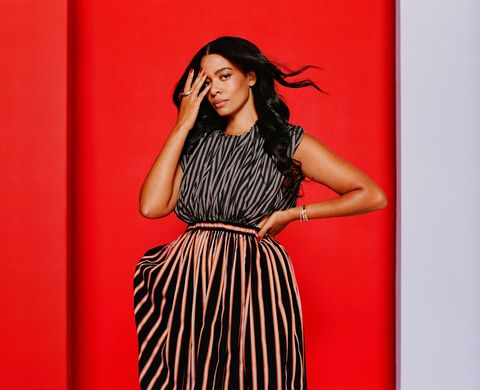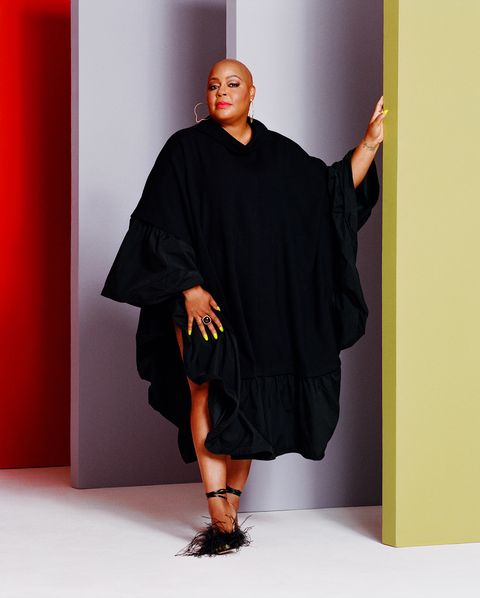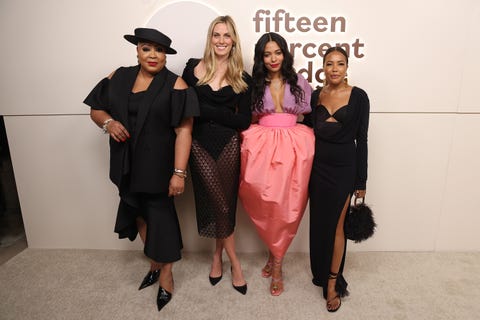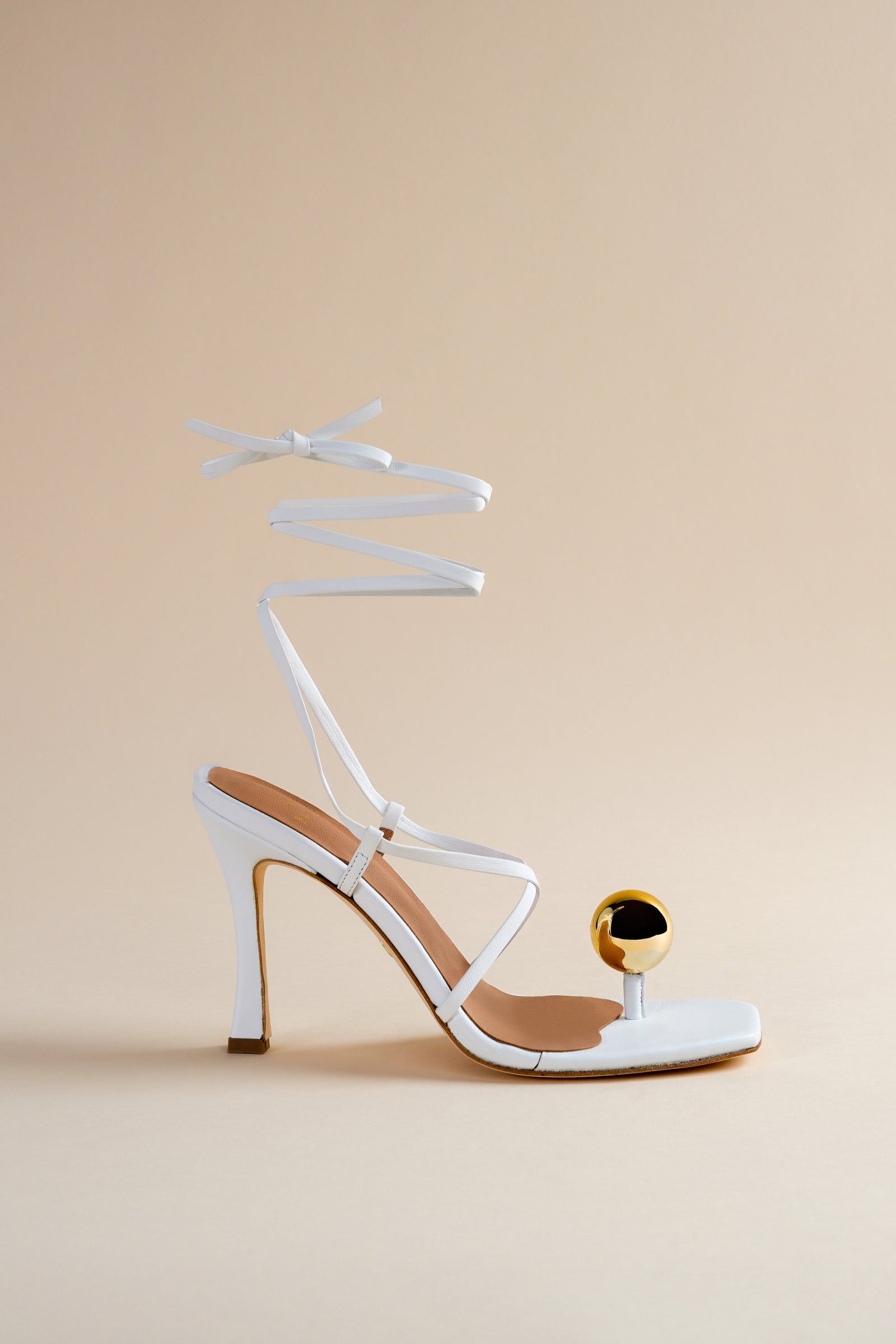“I’ve never been huge on just expecting donations or philanthropy to solve the world’s problems.”
That news flash may be surprising coming from the founder of a nonprofit, but it makes perfect sense when you consider the source. She is Aurora James, the designer behind the footwear and accessories label Brother Vellies and the architect behind the Fifteen Percent Pledge, a young organization with an ambitious agenda.
It was in May 2020 that James noticed one specific problem. In the aftermath of the police killing of George Floyd and the racial justice protests that followed, her social media feed was flooded with empty corporate statements of support for the Black community. The problem was that the companies sharing these posts, many of them in the luxury space all too familiar to James, carried few Black-owned brands on their shelves. It might have elicited no more than an eye roll, but what if there were a teachable moment here for the captains of industry straining to do more than virtue-signal?
More From Town & Country

James took to Instagram and addressed nine brands directly, including Saks, Sephora, Net-a-Porter, and Walmart: Instead of so many sponsored posts targeting a market that makes up 15 percent of the American population, why not commit to at least 15 percent of product orders from Black businesses? She delivered the message not just as an admonishment but as an invitation. “I am a businesswoman,” she wrote. “I am telling you we can get this figured out.”
Hudson’s Bay did. Sephora, Macy’s, and Moda Operandi also. By day’s end, the post had received thousands of likes and comments, and James felt emboldened to formalize its message into a nonprofit advocacy organization seeking economic equality for Black people at every level of the workforce. To date, 29 companies have taken up her challenge, including Sephora. More than 600 Black brands have made it onto retail shelves in North America and the United Kingdom, according to the Fifteen Percent Pledge, resulting in a shift of “more than $10 billion of revenue to Black-owned businesses.” James had figured out a formula for actionable philanthropy that delivers a return on investment.
“I really believe in corporate responsibility and accountability, as well as integrating major corporations into being part of the solution,” she tells me.
James, 38, the daughter of a Ghanaian father and Canadian mother, knows from personal experience what it’s like to be a fledgling entrepreneur. This month she’s up for American Accessory Designer of the Year at the CFDA Fashion Awards, the industry’s highest honor, but the road there was a steady climb that she chronicles in a book out next May titled Wildflower: My Journey Toward Becoming an Amerikan Optimist. She established her label (named after the South African walking shoes known colloquially as vellies) in 2013 and took a decidedly slow-burn approach, not that she had any choice.
“I still own 100 percent of my business because I was never able to find the right investor that truly believed in me,” she says. By the time the pandemic hit, James had built a strong enough foundation for her own business, but other minority-owned independents and startups were struggling. She decided to do something about it, harnessing the power of her social network and the influence of Instagram, where she now has some 230,000 followers.
“I had no choice at that moment other than to put myself out there, because it could mean too much for other people,” she says. “I have a responsibility to leverage my privilege into opportunity for others.”
Today the Fifteen Percent Pledge has 10 full-time staffers, and its board is made up of major players from the worlds of fashion and finance, including chair Emma Grede, who also oversees Good American, the multibillion-dollar Kardashian denim empire; Selby Drummond, Bumble’s chief brand officer; and Rudy Cline-Thomas, the founder of the venture capital firm Mastry. In April the Fifteen Percent Pledge held its inaugural gala, with the theme “Black-Tie, Black Designer”; it raised $1.2 million. (Grede, her husband Jens and Kim Kardashian are also being honored at this year’s CFDAs with the Innovation Award for their work on the shapewear brand Skims.)
“In five years we’ll be blooming wonderfully,” says executive director LaToya Williams-Belfort, who came over from the Partnership with Children shortly after James’s post went viral. That initial note was not just a rallying call for a complacent industry, it set the tone for the group’s approach to winning new converts. The aim is to offer retailers guidance in how to scale Buy Black initiatives and better serve consumers of color, and also access to its Business Equity Community, a database of more than 2,000 Black-owned companies across categories. That platform, currently sponsored by Google Shopping, is available to the public on the Fifteen Percent Pledge’s site; individual shoppers can use it to take inventory of their personal spending. (You can also find a shoppable gallery below.)
“Ultimately, we’re working to close the racial wealth gap, which we know is good economics for everyone,” says Williams-Belfort.
Among the latest signatories is Nordstrom, which confirmed a decadelong contract last year. “We’re in it for the long term,” says Teri Bariquit, chief merchandising officer. “Nordstrom will grow purchases from brands owned or founded by Black individuals by 10 times by the end of 2030. These actions represent the next phase in our journey, not the finish line. We’re committed to doing the work, being transparent about our progress, listening to feedback, and holding ourselves accountable.”
James too knows that the journey ahead is a marathon, not a sprint. Though her organization estimates that about $1.4 trillion in revenue will shift to Black-owned businesses by 2030, only one of the boldface names she tagged two years ago has answered her call. Still, she is unfazed. She says the others are not seeing the big picture—or the big money they’re leaving behind. Sounding like a Harvard Business School professor, she simply offers a historical case study for their consideration.
“If you don’t keep up, you will be Blockbuster,” she says, referring to the video rental chain that was decimated by streaming. “If you want to be resistant to change, that’s at your own peril.”
Photographs by Dana Scruggs
Styled by Anatolli Smith
Lead Image (from left): The Fifteen Percent Pledge’s Emma Grede, chair; Aurora James, founder; Selby Drummond, board member; LaToya Williams-Belfort, executive director. Credits: On Grede: Diotima Blazer ($895). On James: Diotima dress ($795); Brother Vellies sandals ($495); Khiry ring ($365). On Drummond: Diotima Top ($295) and dress ($850); Brother Vellies sandals ($495); Lorraine West Jewelry earrings (from $150). On Williams-Belfort: APOTTS cape; Brother Vellies Sandals ($685); Lorraine West Jewelry hoop earrings ($250); Soko rings (from $98).
This story appears in the November 2022 issue of Town & Country. SUBSCRIBE NOW
Lola Ogunnaike has written about culture, art, and design for The New York Times, Rolling Stone, and Architectural Digest.




